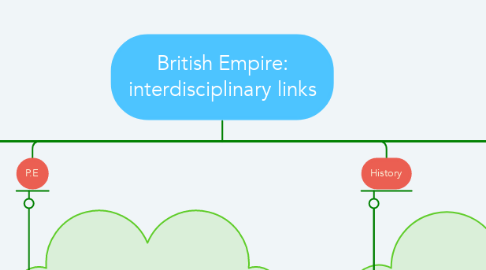British Empire: interdisciplinary links
by Aurora Patti

1. Italian
1.1. comparison between the Italian and rural Verismo of Verga and the English and urban one of Dickens, both with a common theme that is child labor
1.2. the evolutionary theory of Darwin developed during the positivist period of the nineteenth century, which explains the concept of the strongest species, the one able to evolve and survive adapting to the changes of the external world
2. Science
2.1. the plate tectonics and the various movements of the terrestrial plates, included also the earthquakes and volcanoes hypothesized like rebellion to the cruelty of the colonization and the English imperialism
3. Music
3.1. classicism's period and all the musical forms that were obliged to follow the various musicians without possibility of change or freedom of composition. They also had to be under the command of the richest who commissioned the various shows to be done and the forms they were forced to use, especially classical forms and without a real personality
3.2. jazz; seen as a musical genre of response but also rebellion to colonization and the African slave trade, which were forced to work in the American plantations. England also participated in the colonization of Africa and America, along with many other nations, totally modifying all the cultures and the various religions or languages present there.
4. Religion
4.1. all forms of racist discrimination, with regard to the religion of the greatest men like Gandhi, who fought for the independence of India; and Eastern Asian religions including Hinduism. (and the division between India and Pakistan)
5. P.E
5.1. the London Olympics in 1896, which however concern the period of decolonization of Europe, when therefore the British Empire had already lost some colonies.
6. History
6.1. British imperialism and colonialism; the differences between the main European colonial empires, of which Britain is the most important and largest. Which became the most important from a territorial point of view, but also the most economic power of the time.
6.2. The scientific expeditions, in which many explorers and scientists discover new territories and name them as their country of origin to make them belong and we are owned by the country of who found it. However, there is also a period of decolonization in which all the colonies of the British Empire are removed from the aforementioned.
7. Tecnology
7.1. use of coal, which will lead to the invention of the so-called steam machine and subsequently of the analogous train, experimented right among the British and in the period of colonization to increase transport by land
8. Art
8.1. the period of realism, a pictorial movement that exalts the living conditions of the humblest and that no longer wants to represent the classic royalty of the bourgeois world but rather wants to draw attention to one of the most disadvantaged and most troubled social classes of the time , the poorest one
9. Geography
9.1. Nelson Mandela and South Africa: physical, economic, cultural aspect and the great problems, including one concerning its history, the one in which the white minority of South Africa managed to take power and dominate over all other ethnic groups, discriminating the population from the skin black South Africa. Lots of people including Nelson Mandela fought for a long time to ensure that discrimination in South Africa ended, and that finally the population could live and have the same rights regardless of the color of their skin.
10. Spanish
10.1. Spain was one of the nations that contributed most to colonization and imperialism, as did England. The comparison is between the British Empire and the Spanish Civil War, highlighted by the similar methods used and the effects that were caused by the Spanish Civil War, in fact it wanted to aim for a dictatorship is however a supreme control of all Spain while l British Empire wanted to get as many countries as possible under its control so that they could control them both politically and economically by managing trade and economic exchanges in order to make the most of the raw materials of the colonized countries


